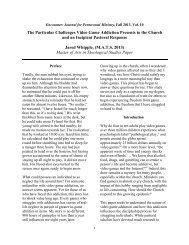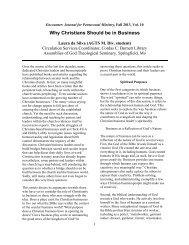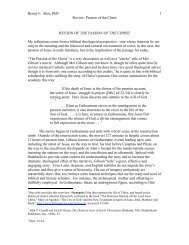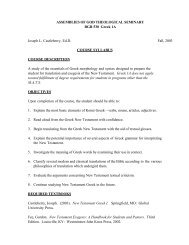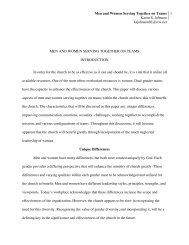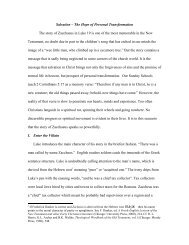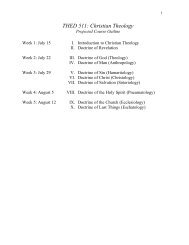Encounter: Journal for Pentecostal Ministry - Assemblies of God ...
Encounter: Journal for Pentecostal Ministry - Assemblies of God ...
Encounter: Journal for Pentecostal Ministry - Assemblies of God ...
You also want an ePaper? Increase the reach of your titles
YUMPU automatically turns print PDFs into web optimized ePapers that Google loves.
24 The context <strong>of</strong> this passage clearly calls <strong>for</strong> a separation from the world by the people <strong>of</strong> <strong>God</strong>. This<br />
separation, as Keener notes, produces organic community cohesion in the midst <strong>of</strong> the opposing interests <strong>of</strong> the world.<br />
However, we remain in the world, and where believers and nonbelievers can interact and work together <strong>for</strong> just ends,<br />
the opportunity should not be ignored. That is where the early Anabaptist separatism went wrong. Thus, political ends<br />
that point to the inherent value <strong>of</strong> each person, that take poverty seriously, and that work toward a „consistent ethic <strong>of</strong><br />
life‟ should be collaborated on by nonbeliever and believer alike. On the John passage, see, Craig S. Keener, The<br />
Gospel <strong>of</strong> John: A Commentary, vol. 2 (Peabody, MA: Hendrickson Publishers, 2003), 1057-61.<br />
25 In<strong>for</strong>mation <strong>for</strong> this section can be reviewed in Black, Beyond Left and Right, 142-3.<br />
26 Ibid.<br />
27 This section looks at the proposals from my <strong>for</strong>mer pr<strong>of</strong>essor, Jane E. Grant, The New American Social<br />
Compact: Rights and Responsibilities in the Twenty-First Century (Lanham, MD: Lexington Books, 2008).<br />
28 Ibid., 1-2.<br />
29 Ibid., 2.<br />
30 Grant is here developing from the “civic republican” ethos that dominated early in the country‟s history,<br />
then to the “procedural republican” ethos which became central through the 20th century, to now a new ethos that is<br />
required that would incorporate valuable aspects from both the civic and procedural republics. Ibid., 2-3.<br />
31 Ibid., 3-4. Typical <strong>of</strong> today‟s average citizen is a complete negligence <strong>of</strong> a sense <strong>of</strong> obligation. Liberalism in<br />
the modern day has become devoid <strong>of</strong> duty, duty found in the German Grundgesetz (Basic Law or German<br />
Constitution), Article 14.2 “Property involves obligation. It must be used <strong>for</strong> the benefit <strong>of</strong> all.” This essentially builds<br />
a civil community unfeasible without serious reshaping <strong>of</strong> our common involvement. Grant states that the “United<br />
States is not, in good faith, fulfilling its commitments to the people and the other nations in the world. We have<br />
substituted <strong>for</strong>ce <strong>for</strong> diplomacy, arrogance <strong>for</strong> humility, and power <strong>for</strong> what is right.” Not only have we failed in many<br />
respects as responsible citizens, but also the United States has continually neglected its commitment and obligations to<br />
the world community by breaking numerous treaties and conventions <strong>of</strong> the U. N. This is detrimental when a leading<br />
nation disregards the voice <strong>of</strong> the rest <strong>of</strong> the world population. Grant, The New American Social Compact, 137, 151.<br />
Grundgesetz quoted in Jürgen Moltmann, <strong>God</strong> <strong>for</strong> a Secular Society: The Public Relevance <strong>of</strong> Theology, 1997, trans.<br />
Margaret Kohl (Minneapolis: Fortress Press, 1999), 154.<br />
32 Grant, New American Social Compact, 154.<br />
33 Ibid., 154-5.<br />
34 Anders Richardson, “Political Complexities and Rivalries <strong>of</strong> Pneuma and Imperia,” in Evangelicals and<br />
Empire, ed. Bruce Ellis Benson and Peter Goodwin Heltzel (Grand Rapids, MI: Brazos Press, 2008), 139-40.<br />
35 Ibid., 139-40.<br />
36 She states earlier in the book that, “To a very great extent, liberal theory places individual autonomy (and<br />
the derivative efficiency <strong>of</strong> the market) at the <strong>for</strong>efront <strong>of</strong> what society should value and protect. Yet, by so revering<br />
individual liberty, liberalism, especially as it operates presently in the United States, diminishes, at least in the public<br />
sphere and governmental sectors, the importance <strong>of</strong> providing opportunities <strong>for</strong> deliberative consideration <strong>of</strong>, and<br />
concerted action on, questions dealing with shared obligations and public principles.” Grant, New American Social<br />
Compact, 7, 152.<br />
37 Ibid., 152.<br />
38 Ibid., 151-3.




